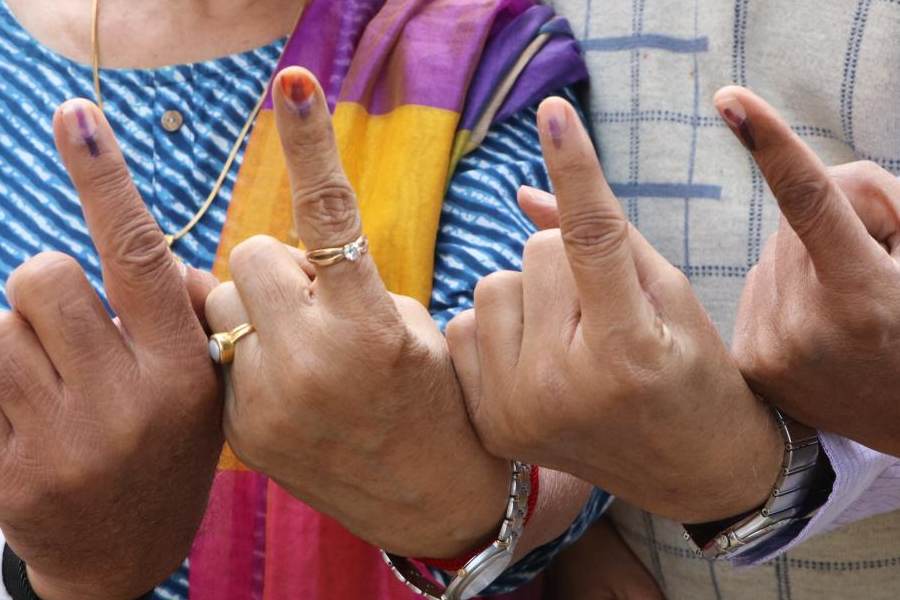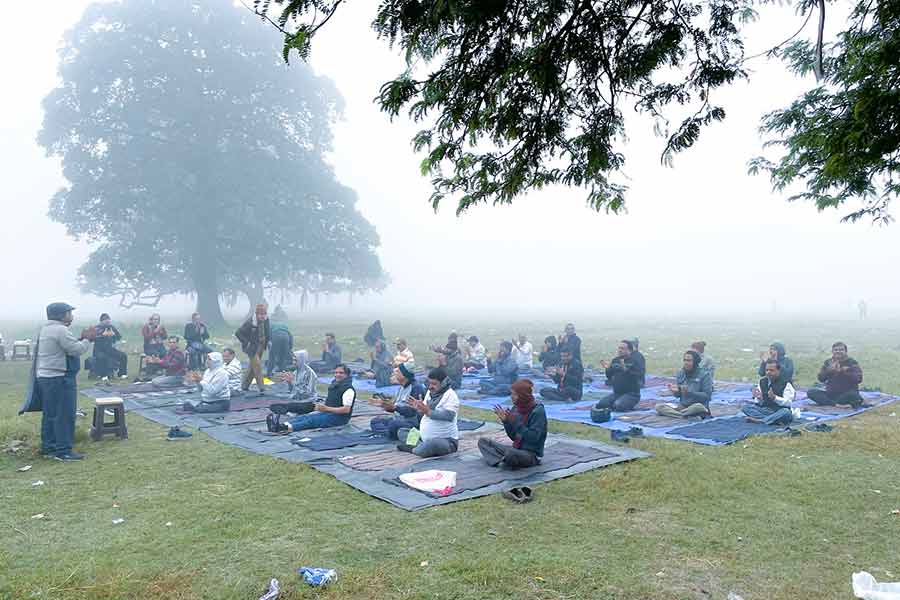 Thursday, 12 December 2024
Thursday, 12 December 2024
 Thursday, 12 December 2024
Thursday, 12 December 2024
It’s 7am on a weekday. Rajesh, a man in his thirties, parks his motorbike outside a tea stall in Rajarhat on the suburbs of Kolkata. He wears a jacket bearing the bright red logo of Zomato, India’s food delivery giant with a market cap of Rs 2,84,927 crore.
His day begins well before sunrise in a cramped, dimly lit one-room apartment on the fringes of Kolkata that he shares with two other delivery workers.
Rajesh, who is from a village in Bihar, came to Kolkata two years ago, hoping to send money back to his parents and younger siblings. An Arts graduate, his dreams of an office job faded as opportunities eluded him.
So by 7.30am, when most morning walkers have not gone back home, he is done with three deliveries. He checks his smartphone as another order pings in. “Let’s go,” he says, adjusting his delivery bag.
In another end of Kolkata, Tapas, another man in his thirties, joins the digital bandwagon a little later in the day. From 7am to 11.30am, he sells vegetables. From noon to midnight, he’s on the streets, delivering food for Zomato.
Rajesh and Tapas – these are not their real names – are two of millions of “gig workers” who form the backbone of India’s burgeoning app-driven economy.
Last week, Vijay Shekhar Sharma, CEO of fintech firm PayTM, shared a video of a bike rider who said he earned between Rs 80,000 and Rs 85,000 monthly from working for app-driven services.
“India’s new-age technology firms have sparked a revolution in job creation at scale, generating crores of well-paying jobs that fuel our local economy. These colleagues are building a digital services ecosystem that the world admires—quick deliveries, local rides, and Paytm QR at every corner,” Sharma wrote on his X (Twitter before Elon Musk took over) handle.
He added: “Proud of every member of Indian Digital Services, who works relentlessly and takes pride in their work. (Yes, I prefer to call them members of Indian Digital Services instead of gig workers). Together, we’re shaping a more inclusive, innovative, and proud Digital India.”
Rajesh says he earns Rs 15-25 for every delivery he completes. On a good day, he takes home Rs 700. His monthly take-home is between Rs 15,000 and Rs 20,000. He pays around Rs 200 daily for petrol and a similar amount per month for motorbike maintenance and penalties for delays that are often beyond his control.
Tapas says he used to get Rs 10 per kilometre but now makes Rs 7. The company changed the rate, he says.
Tapas, who studied till Class XII, lives with his parents, wife and child. He says he earns Rs 20,000 a month from Zomato. He and his father are the earning members of his family. It’s a hard life, he says, even though they live in their own house.
“We must complete 12 deliveries a day to get a Rs 125 incentive,” Tapas says. “Once, I got an order at 11:55pm that was 17 km away. I cancelled it because I’d have reached home after 2am, and I lost the incentive entirely.”
Workers must upload selfies three times a day, with their Zomato kit visible.
“We have two minutes to do it,” Tapas says. “Once, I delivered on the 20th floor and by the time I reached my bike for the photo the time had lapsed.”
Zomato is scaling corporate heights. Its stock touched a record high of Rs 304.65 on December 5. On December 23, it will join the BSE Sensex.
Zomato CEO Deepinder Goyal’s net worth has reportedly surpassed Rs 8,300 crore. People have lauded his decision to forgo his annual Rs 3.5-crore salary until FY26 as visionary leadership.
He has a knack for making news.
Once he went out to deliver orders with his wife on his Triumph motorbike – which costs over Rs 2.5 lakh – wearing his Zomato t-shirt and posted pictures and videos on Instagram with the soundtrack of eighties’ dancefloor hit Eye of the Tiger from Sylvester Stallone’s Rocky 3.
“Loving delivering food to our customers, and enjoying the ride,” Goyal wrote.
He recently appeared on The Kapil Sharma Show and with YouTuber Ranveer Allahbadia on The Ranveer Show, where he spoke about work culture and professionalism.
Rajesh and Tapas both put in far more than the 70-hour work-week prescribed by software industry patriarch N.R. Narayana Murthy for a growing India’s workers. And they don’t get holidays. If they don’t work, they don’t get paid.
Rajesh joined Zomato in 2018, Tapas a year later. Both of them say they used to earn a lot more money when they first joined.
“I used to earn a maximum of Rs. 1400-1500 on some days, but now I barely make Rs 700-800,” Rajesh says.
Tapas says, “Things have changed a lot; things are far worse now.”
“During rains, we have a rain surge,” Rajesh says. “We are supposed to get 15-30 per cent extra, but we only get it for the first two deliveries at times. For the third, we don’t, even if it’s raining heavily. They just keep saying ‘send pictures to prove it is raining’.”
Tapas and Rajesh both say for delivery agents like them, benefits like accident insurance or healthcare coverage exist only on paper. They share anecdotes about colleagues who had accidents but never got any reimbursement.
Regulation offers some hope, but it’s moving at a snail’s pace. The Social Security Code, 2020, promised basic protections like accident insurance for gig workers. Implementation remains inconsistent. It hasn’t touched the lives of gig workers like Tapas and Rajesh yet.
In August 2021, Prime Minister Narendra Modi launched the e-Shram portal, intended to provide social security measures – including medical and accident insurance, pensions and subsidised foodgrains – to India’s unorganised workers.
The news website Article 14 spoke to around 50 informal workers from various occupations in September this year, including some who had registered for e-Shram, in Karnataka, Maharashtra, Telangana, Meghalaya and Delhi and found that not a single one could list the benefits of e-Shram.
Karnataka’s gig workers’ law promises protection, but that is in just one state and already there are grumbles that it may hit company bottom lines.
A recent NITI Aayog report projects India’s gig economy workforce, currently estimated at 7.7 million, will reach 23.5 million by 2030. Nearly 47 per cent of these workers earn less than Rs 20,000 monthly, with expenses consuming over 60 per cent of their earnings.
Workplace injuries are common, with recent studies highlighting their vulnerability to musculoskeletal disorders due to the physically demanding nature of their job. A study last year from , the P.E.S Modern College of Physiotherapy focused on e-commerce delivery workers in Pune revealed that low back pain (69.06 per cent) and shoulder pain (59.36 per cent) were the most prevalent ailments, attributed to long hours of bike riding, carrying heavy loads, and static postures.
According to a report attributed to the Indian Federation of App-based Transport Workers (IFAT), 95.3 per cent of the delivery riders said they have no form of insurance – accidental or medical.
The rest shouldered medical expenses themselves, often through high-interest loans that trap them in cycles of debt.
“If my bike breaks down or I get injured, I have to pay for repairs or medicine myself,” Tapas says, adding that even minor grievances are ignored. “If we complain to Zomato about anything, the response is always, ‘Take care’.”
A 2023 study in the Journal of Labour Economics found that 62 per cent of Indian gig workers report severe sleep deprivation, while 74 per cent suffer from chronic back pain. Mental health issues, such as anxiety and depression, affect nearly half the work force, according to the All India Gig Workers Union.
Food aggregators often label their delivery workers as "platform partners," framing their association as a flexible, day-to-day relationship. By positioning these workers as entrepreneurs, companies shift the burden of risks and operational costs onto the individuals. This model creates an illusion of autonomy, encouraging workers to view their efforts as an investment in future rewards.
However, this dynamic often manifests as "hope labour" — a form of self-exploitation driven by the anticipation of eventual benefits that may never materialise.
As Rajesh swerves pothole-strewn roads, juggling delivery deadlines with the chaos of urban traffic of Rajarhat, Sector V, New Town and Salt Lake – all suburbs of Calcutta – his phone pings again. Another order. Another kilometre. “It’s not a choice,” Rajesh says. “It’s survival.”
A smile masks his exhaustion.
In another end of Kolkata, Tapas says he wants out. “I’m planning to shift to other alternatives soon,” he says as he heads off for another delivery.







